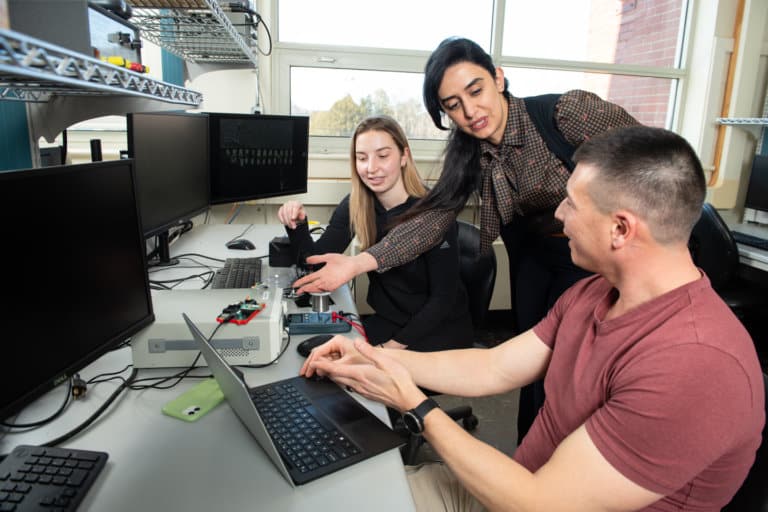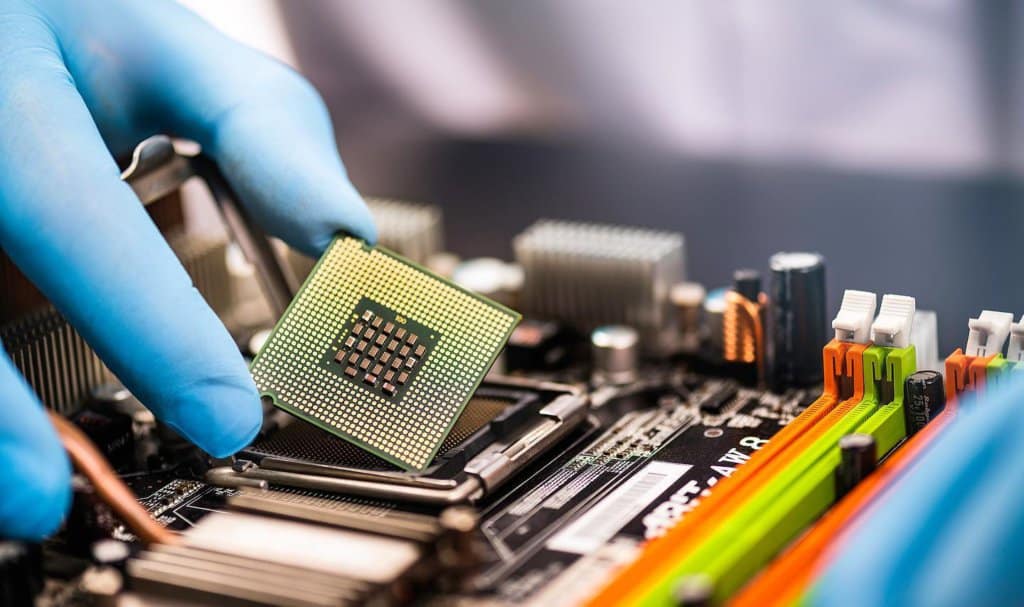
Electrical and computer engineering (ECE) are broad fields of study that come with many benefits. It gives students a solid foundation in mathematics, physics, and computer science and specialized insight in digital signal processing, robotics, and telecommunications. This knowledge can be applied to various industries and fields — including software, renewable energy, electric cars, control systems and biomedical technologies — and sets graduates up for diverse career paths.
ECE graduates can become electrical engineers, computer engineers, software developers, network administrators, and systems analysts. Beyond industry, they can pursue roles in academia and research as well, working on cutting-edge technologies and developing innovations.
With rapid advances in technology showing no signs of stopping, there are more opportunities to come. As new innovations turn into integral parts of our lives, so will the need for skilled professionals who can power and upkeep them.
To become one of them, having a robust education and relevant experience is necessary. These universities below offer both — and so much more:

Source: University of New Brunswick
University of New Brunswick
The University of New Brunswick (UNB) has an illustrious history dating back to 1785, making it the oldest English-language university in Canada. Its Department of Electrical and Computer Engineering (ECE) is part of the Faculty of Engineering at UNB, home of the oldest engineering program in Canada and one of the oldest in North America.
Today, the Department of Electrical and Computer Engineering is building on its track record of excellence to offer undergraduate programs filled with hands-on experiences in labs fitted with the latest technology. Students are exposed to a thorough design experience throughout the degree, culminating in a full-year multi-disciplinary design experience, often in collaboration with industry clients. A substantial benefit of participating in UNB’s programs is the option of gaining industry experience through co-op work placements that connect students and prospective future employers.
There are various ECE learning pathways from which to choose, each with its own perks. For instance, the Software Engineering program (one of a handful in Canada) is a collaboration between the ECE department and the Faculty of Computer Science. It offers students expert instruction that draws from both faculties. The Software Engineering program is one of 14 accredited by the Canadian Engineering Accreditation Board (CEAB) and the only one certified by this body in Atlantic Canada.
Those who seek to develop new technologies that we use in virtually every activity of our lives can join the Electrical Engineering program. Leading students into one of the most dynamic and pervasive fields of applied science today, the program explores how electrical engineers are behind some of the most important features of modern life, including renewable energy, industrial robots, and immersive technology. Both the electrical engineering and software engineering degrees offer a biomedical engineering option. In addition, the electrical engineering degree includes a computer engineering option.
At the graduate level, there are three programs on offer: a research-based Master of Science in Engineering (MScE), a course-based Master of Engineering (MEng) and a Doctor of Philosophy (PhD). There are numerous areas of research from which to choose. Some active areas include AI, Biomedical Systems, CubeSats, Machine Learning, Photonics, Prosthetic Limb Design and Control, Rehabilitation Systems, Smart Grid Power Systems, Software Systems, Thin Films, and Wireless Power Transfer.
Research here is as renowned as it is prolific. The Institute of Biomedical Engineering (IBME) is world renowned for prosthetic limb research and for hosting world-leading prosthetic limb system researchers at its MEC conference every three years. Other highlights include the efforts of the Emera & NB Power Research Centre for Smart Grid Technologies to revolutionize electrical power grids. UNB CubeSat researchers are designing, building, and testing a miniature satellite in preparation for its launch, working in tandem with Université de Moncton and New Brunswick Community College.

The Grainger College of Engineering produces capable and experienced graduates. Source: University of Illinois Urbana-Champaign
University of Illinois Urbana-Champaign
The Grainger College of Engineering at the University of Illinois Urbana-Champaign has an undergraduate program that is ranked seventh overall with nine top five programs and specialties, according to US News and World Report. What makes their college so successful is the engaging professors, state-of-the-art facilities, unparalleled student resources, endless opportunities and class environments that are supportive and conducive to innovation.
The Electrical and Computer Engineering Department, in particular, boasts good rankings. The 2023 US News and World Report rankings place the undergraduate electrical engineering program in seventh place while the undergraduate computer engineering is sixth. For graduate programs, computer engineering is fifth and electrical engineering comes in fourth.
This department has quite a fascinating history that dates back to 1891 when the first courses in electrical engineering were offered in the first electrical laboratory. Over the years, the department has been home to many innovative minds, including Nobel Prize winner Jack Kilby who invented the integrated circuit at Texas Instruments in 1958, and Professor John Bardeen, who is the only person to have won two Nobel prizes in physics.
Other than the prestige the university is known for, there are many reasons the school is sought after. Illinois’s ECE program brings together a solid foundation in engineering with more hands-on learning methods, and students may even choose courses that cater closely to their individual interests. Faculty undertake research in a broad range of topics, which gives MS and PhD students the chance to work closely with them in those areas.

Georgia Institute of Technology’s ECE school is one of the world’s largest producers of electrical and computer engineers. Source: Georgia Institute of Technology
Georgia Institute of Technology
Georgia Institute of Technology’s College of Engineering knows that the demand for their ECE graduates is on the rise. The School of Electrical and Computer Engineering’s graduate programs are in the top five in the recently published 2023-24 edition of the US News & World Report national rankings. “The rankings affirm the value of ECE’s excellence-at scale-approach in providing a high-quality education to a broad and diverse range of students, preparing them for the demands of a rapidly changing world and workplace,” says Arijit Raychowdhury, the Steve W. Chaddick School Chair for ECE. “The hard work and dedication of our entire community is reflected in the school’s continued recognition.”
Georgia Institute of Technology’s ECE school is one of the world’s largest producers of electrical and computer engineers. Their autumn 2022 enrollment had 2,543 students taught by 143 educators. The department leads over 20 research centers with US$70 million in research funding. They offer customisable pathway options with 11 technical interest areas, more than 300 student organizations, over 80 study abroad programs and more.
The school leans into the diversity of this area by providing an extensive range of courses, which means the students go into all kinds of industries, from energy, robotics and manufacturing to defense and computing. Students gain hands-on experiences in research centers and labs, which enable them to compete in a global and high-tech marketplace with their know-how on how to increase efficiency, enable faster communications, provide cleaner energy sources, help people with disabilities lead fuller lives, and more.

The University of California San Diego’s ECE department is built on the fundamentals of applied mathematics and engineering physics. Source: University of California San Diego
University of California San Diego
The Center for World University Rankings (CWUR) named the University of California San Diego as the world’s 20th-best university, while its campus ranks 16th among US universities. The university’s Jacobs School of Engineering offers graduate programs leading to MS and PhD degrees in 13 electrical and computer engineering disciplines. The ECE department includes over 60 faculty members heading exciting research in signal and image processing, machine learning and data science, intelligent systems, robotics and control, and more.
The school’s ECE department has a history that traces back to 1965, under its founding chair Henry Booker. It began with the Department of Applied Electrophysics, which became Applied Physics & Information Science, then Electrical Engineering and Computer Science, and finally, ECE. The vision for the school began with a focus on information and communication theory and systems, radio physics, and quantum electronics.
As the department is built on the fundamentals of applied mathematics and engineering physics, students receive multidisciplinary, systems-oriented education and research in 11 core areas. These are Applied Ocean Sciences, Computer Engineering, Communication Theory and Systems, Electronic Circuits and Systems, Electronic Devices and Materials, Intelligent Systems, Robotics and Control, Medical Devices and Systems, Nanoscale Devices and Systems, Photonics, Radio and Space Science, and Signal and Image Processing.
*Some of the institutions featured in this article are commercial partners of Study International







